rain and gardens and living well in the future
Living well in the future won’t be about how much land you own, but how wisely you use it - less decorative, more practical, and deeply connected to earth, food, energy, and community. Old fashioned.
As a kindness please hit ❤️LIKE on your way past. This helps with reach and someone out there may need to read this today.
It is darker in the mornings here now. In Australia. Even since last week it seems to be darker in the mornings. I have a view of the sunrise though. Sunrises are so hopeful. So consistently hopeful and having hope show her face every single morning is - what’s the word - divine?
And it is raining this morning. And cool. For the first time in a long time. The neighbours tell me it has been a long, hot, dry Aussie summer. So the rain is nice. And dark, cool, rainy mornings are conducive to cosy writing corners. And garden watching through the poets window, the window that inspires you the most.
Do you have a poets window? The window you find yourself standing in front of - staring out into the view - sipping on tea - just thinking.
Please find enclosed today’s recording of The Blue Castle by LM Montgomery and narrated by me. Scroll right down till you see the chapter marked Stop Scrolling.
BONUS! I brought Alice back from behind the paywall. And I am never putting books behind the payroll again. I am done with that.
Alice in Wonderland and FREE for all now. A rainy day is the perfect day for resting on the couch with a story. Upgrade to a paid subscription if you are able. This page is my only income presently. I know I am a wee bit eclectic and a wee bit random and so I am running a wikipedia subscription model - those ones who can afford $5 dollars a month are lifting up those who can’t.
Rain vs Hoses.
Rain. I hear it tapping on the footpath and playing in the puddles. I see the drops jiggle the leaves of the roses back to life. Washing off the grime of life and raising a hesitant rose scented smile. Other than muddy paws in the kitchen rain brings a garden to life. Brings colour back. And is good for the garden. Rain is.
Rainwater contains beneficial nutrients such as nitrogen, and is naturally oxygenated, which enhances plant growth and health by reducing the risks of waterlogging and root. This oxygen-rich environment supports beneficial microorganisms in the soil, enhancing their ability to perform essential ecological processes.
Rainwater also lacks chemicals like chlorine that are found in tap water, though good for making sure our tap water does not run green, they are not necessary for plants. In fact chlorine is detrimental to the health of our plants.
Which is why if you have seeds in the ground, when it rains they are more likely to pop up.
I plant in blocks not lines. Mainly because I can’t draw a straight line to save myself. And gardening is an artistic expression for me as well as a good way to provide food for my people. I love looking into a garden that is painterly. Painterly is not the best word but you know what I mean. The gardens become a patchwork of watercolours. I also sow the seeds thickly because I eat the seedlings I thin out. No matter how tiny. I wash them and pop them into salads. Nothing is wasted. I eat the thinnings - roots and all usually.
Eating thinned plant roots and leaves, such as those from lettuce, beets, cabbage, and silverbeet, provides nutritional benefits due to their rich content of vitamins, minerals, and antioxidants. These young plants are often high in vitamins A and C, potassium, and fiber, contributing to healthy digestion and immune function.
Rain helps the garden grow. So obvious but also bound up in keeping our rain and air healthy.
TIP about garden seeds: Remember to keep your seeds in a sealed container in the fridge. When seeds heat up (out in the shed) they begin to lose their integrity. And we don’t want to lose our integrity do we!
TIP about water: Use chlorine free rain water for your sourdough too. (The enzymes in sourdough don’t like tap water.)
I called this loaf The Bottom.
I also plan for baby plants to eat. That sounds weird I know but I told yuo I am an unusual gardener! As well as eating the thinnings I love to harvest and eat young plants from the second round of thinning. This way we can use quite a small space to grow the veg and not have to wait the whole season to eat.
Kale for instance is a different leaf when eaten young. I would never eat mature kale leaves. They are worm food!
Baby leeks
Baby kale
Baby green leaves
Baby beets
Baby green onions
For fertiliser I am using the worm compost. And in fact I am throwing some worms in as well so they can multiply in the raised beds. Worms are critical to soil health.
Worms aerate the soil, break down organic matter into rich compost, and improve drainage, creating a healthier environment for plants to thrive.
For mulch I use the garden itself. I don’t buy dyed bark mulch - ever. I have no second use for the plastic bags and bark will wick moisture away from the plants roots. Instead I use grass clippings and pruned leaves and autumnal leaves swept from the paths.
(The boards are on the garden to keep Daughters cat from digging up the loose soil - plus they help me mark of sections for the patchwork garden).
Don’t waste the clippings from your mowings, don’t throw them in that green bin to be taken off the property - use them yourself, they are a great source of nutrition for your garden and a weed suppressor. If you mow your lawns and there are no seed heads in your catcher empty the catcher into your garden. I sprinkle them all over and either dig it in or use it as mulch.
If you have big lawns and too many lawn clippings for your garden throw them in the compost.
Grass clippings are beneficial for gardens because they act as a natural fertilizer, retain moisture, and suppress weeds, ultimately enhancing soil health and supporting plant growth.
The essence of sustainable living in my opinion is eliminating as much waste as possible. It makes me cry when I see gardeners throwing away leaves and grass clippings.
Solar Energy
Solar Energy, like wind, is never going to be 100% sustainably managed for the good of the Earth. There are imported components and machined parts - so the panels themselves are not planet friendly. However in the long run solar (post production) creates little pollution. And it is a good beginning. We have solar panels up on top of my little studio feeding the house with clean energy. So far we have had multiple sunny days here in Sunbury, Melbourne. And have spent next to nothing on electricity. On rainy days we are not collecting energy from the sun. But that’s ok. We have banked it. This is my first rainy day here and we have been banking energy. Here is our bill!
It helps to have a government that has a program to subsidize the installation of solar panels. This effectively turns a suburb into a solar power plant with zero daily pollution. Solar panels have no moving parts which contributes to their longevity (up to thirty years of efficient power and longer with good maintenance) and cleanliness. Friction wears stuff out as we know.
Which is why avoiding friction in your life is a good idea.
My son in New Zealand is taking advantage of a local scheme to put solar panels at his place this year too. He will contribute to the energy of his country plus massively lowering his power bill in that big house on the beach.
We don’t always need a gadget to harness the power of the sun. Drying your clothes using solar energy - on a clothesline - straight from the sun not only saves power but saves your clothes from the wear and tear by a dryer and helps mitigate the micro plastics we release into the air we breathe. Both indoor and outdoor.
A dryer full of clothes, especially those made from synthetic materials like polyester, can emit significant amounts of micro-plastics into the air. For instance, a single 15-minute drying cycle can release between 433,128 and 561,810 microfibers, which is more than what washing machines produce. Annually, a household dryer can emit up to 120 million microfibers. These emissions contribute to environmental pollution and potentially affect indoor air quality.
Having solar does not mean we can waste power though. Lights off as you leave a room. Doors shut in empty rooms. Dry clothes on racks or clothes lines. Dress for the season (heating and cooling are the biggest users of power). Pop over to the Mother Ship (thekitchensgarden.com) for more of the Day to Day of Nanny Granny and the Compact Kitchen’s Garden and developing a sustainable lifestyle.
John’s Scalloped Potato Recipe.
St Patrick’s Day - a little late but there you are! I hope you are all going to be eating your potatoes.
Potatoes are nutrient-dense, providing vitamins C and B6, potassium, fiber, and antioxidants, while being low in fat and calories, the skin itself contains a significant amount of fiber, potassium, and other minerals like zinc, calcium, and iron.
And in the home of a pregnant woman we are chasing iron and calcium!
TIP: To absorb iron efficiently it needs to be paired with vitamin C. So grow and eat parsley. There is more vitamin C in parsley than there is in an orange, plus the parsley is paired with iron and ready to ingest and digest and utilise!
Now back to our potatoes! Does your scalloped potato dish sometimes curdle?
In my humble opinion a silky cheese sauce makes everything better in the kitchen. And it is a great addition to your scalloped potatoes. For your scalloped potatoes: butter a baking dish and rub the dish with garlic. Thinly slice potatoes and onions. Stand them up like books in the library, in the buttered dish, keep them snug so every sliver of potato gets a chance at a crispy top. Pour over a simple cheesy béchamel with parsley - just butter, flour, milk, cheese, salt, pepper and a whisper of nutmeg. Scatter grated cheese on top.
.Bake at 375°F (190°C) until golden and bubbling. Let the potatoes rest a moment, then serve hot.
Meanwhile Back on the Farm
John back in Illinois got all carried away with spring fever at The Tractor Shop and bought himself some ducklings.
They are a lot of extra work but I see how he cannot resist! But after our last flock was decimated by coyotes he is a braver man than me.
The little pigs are growing bigger.
Stop Scrolling!
You are here. Time to listen to todays chapters. Time to rest your weary head. God knows my head is weary. Full of worry for my adopted country while I am out here in the antipodes on baby assignment. I feel the guilt of the rat - jumping off the ship as it passed a safe harbour.
If all goes well - we have just over two months in our little house before Daughter and I are joined by the new baby. Babies have a habit of changing lives. Which is why it is important that women retain the right to choose to have a baby. There is great power in choice. There is great love in those who allow us choices.
All welcome here. All new comments and subscribers welcome.
Keep the comments section positive and kind. The Comments on these posts are as important to read as the post itself.
Your voice is important.
Have a great day.
Celi
PS Sorry this is a day late but NOT a dollar short!! Life. This publication follows my gardening and farming life so living that life is bound to have its own timetable and its own drummer - we roll with it.






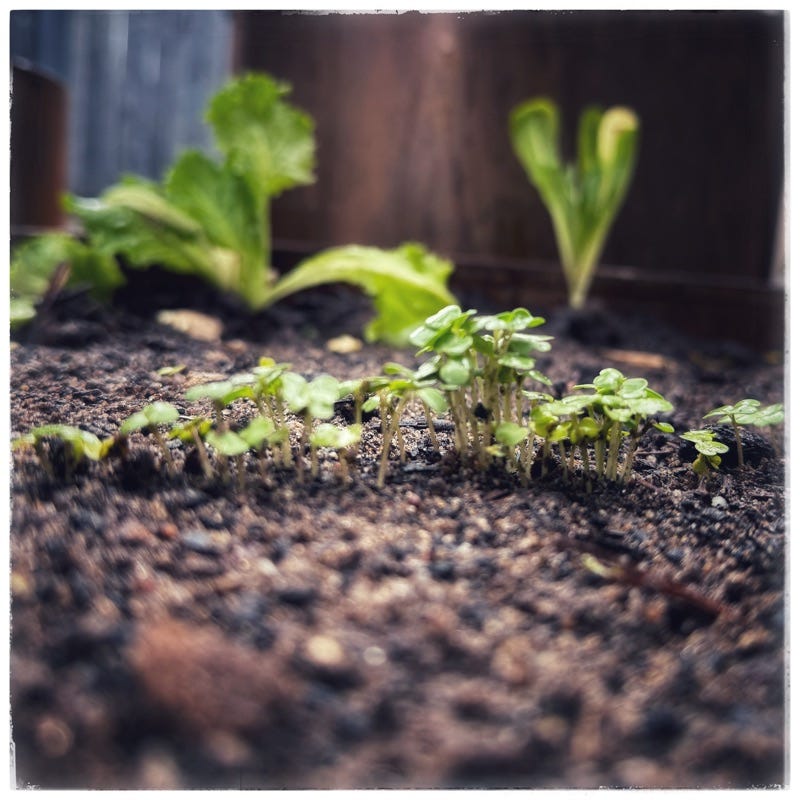

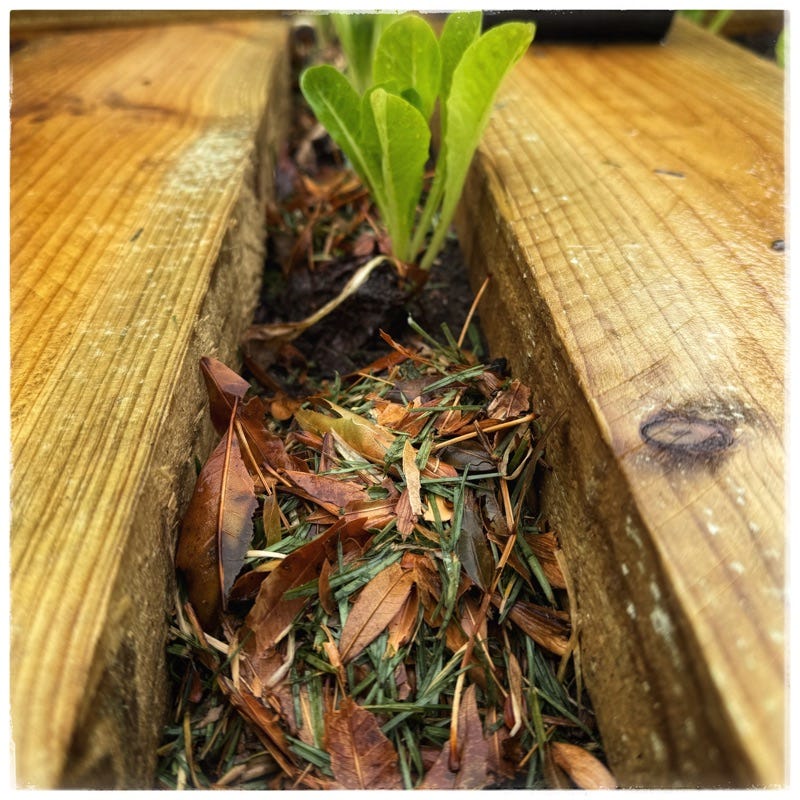

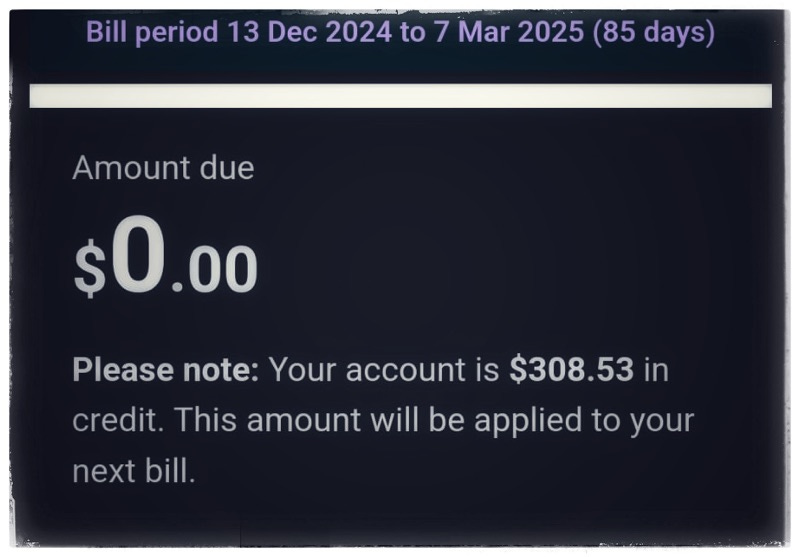

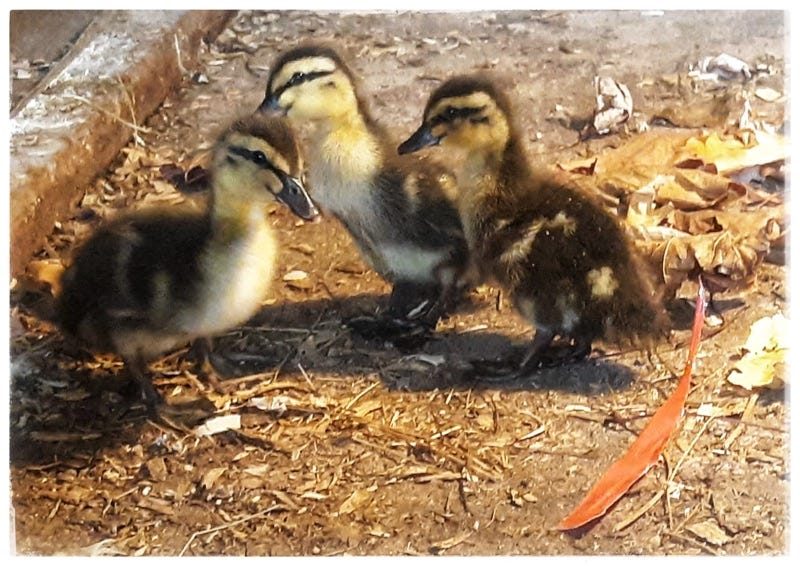
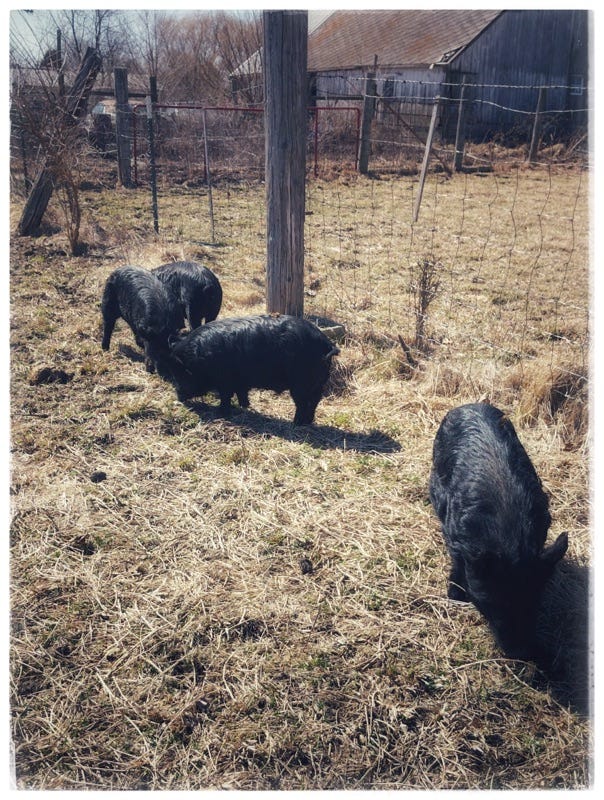

Ahh the poet window.
Everyone should have one.
It’s this spot by the window where I can just sit with my coffee and watch the world or squirrels go by. Your gardening tips are also pretty great, especially the part about the rainwater and how it’s actually better for plants. I’d never really thought about the chlorine in tap water being a problem for the garden, but it makes sense. We don't have too much rain in SoCal, so I rely on tap water, and it's so harsh that it turns my glasses white. It could be why my plants don't last very long :)
Thank you for sharing, as always, Cecilia.
I wish you the best weekend.
Hi, Cecilia! Thank you for all of the useful advice.
Our earthworms will be happily reproducing as soon as it starts to warm up on our little farm in back of the house. Did you know they like coffee grounds? We have moles, and unfortunately, the worms are oftentimes their dinner.
We had solar installed after the 9.0 quake here in Japan 14 years ago this month. The electricity company paid out a small amount to people who produced more than what they used. Of course, that's gone now, but they've okayed restarting some nuclear power plants. Do we have our priorities straight, I wonder....
I didn't know about the chlorine, although it makes sense. M has an organic fertilizer that she mixes with water, but she always leaves the bucket out for a day or two so the chlorine escapes before she mixes it in and spreads the water. We don't have too much space, but what rain we do get we try to capture in buckets. Not enough to do much good, especially now that the summers are so extreme. Can only resort to hose water in the evenings.
I never thought about eating the seedlings when thinning out the plants! Great idea. I have a bunch of seeds from last year. I might plant them just to get the sprouts.
We don't have a lawn, but we do get bags of leaves from the hillsides and mix them in when turning over the soil in spring. The worms love them, too.